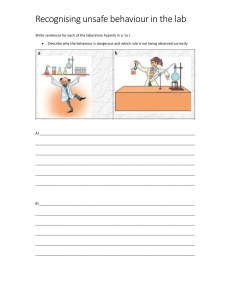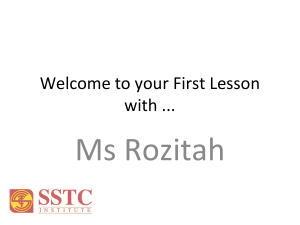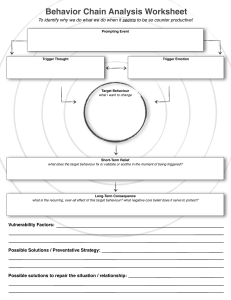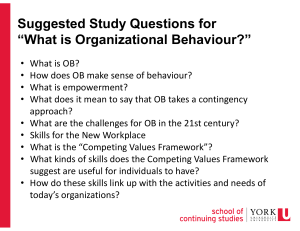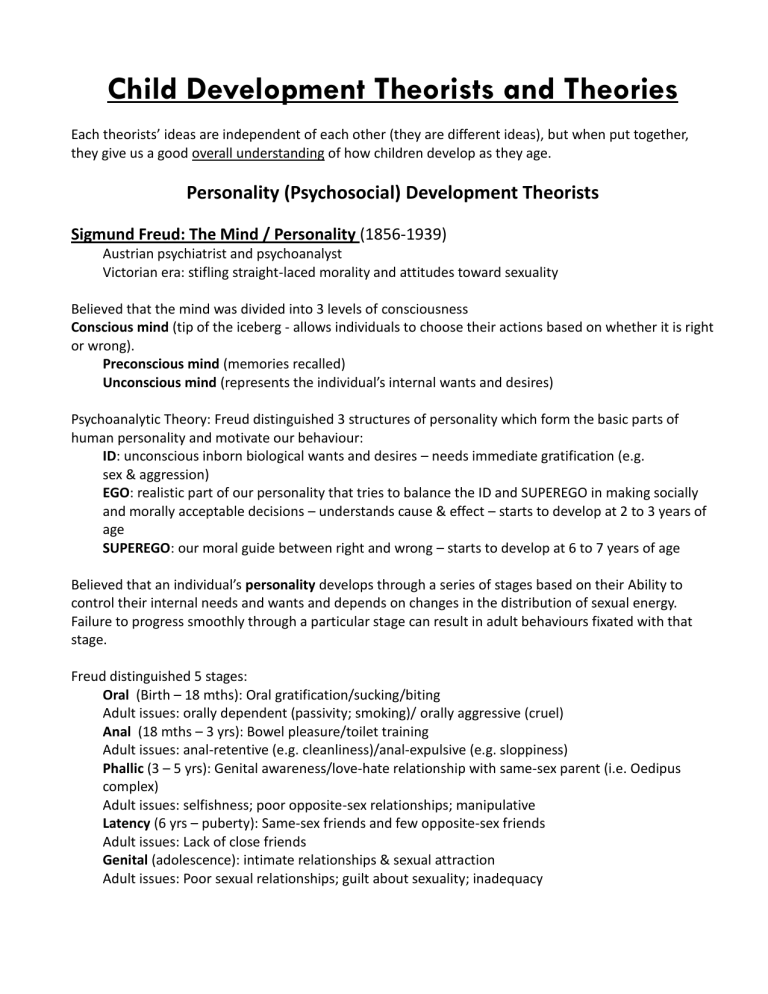
Child Development Theorists and Theories Each theorists’ ideas are independent of each other (they are different ideas), but when put together, they give us a good overall understanding of how children develop as they age. Personality (Psychosocial) Development Theorists Sigmund Freud: The Mind / Personality (1856-1939) Austrian psychiatrist and psychoanalyst Victorian era: stifling straight-laced morality and attitudes toward sexuality Believed that the mind was divided into 3 levels of consciousness Conscious mind (tip of the iceberg - allows individuals to choose their actions based on whether it is right or wrong). Preconscious mind (memories recalled) Unconscious mind (represents the individual’s internal wants and desires) Psychoanalytic Theory: Freud distinguished 3 structures of personality which form the basic parts of human personality and motivate our behaviour: ID: unconscious inborn biological wants and desires – needs immediate gratification (e.g. sex & aggression) EGO: realistic part of our personality that tries to balance the ID and SUPEREGO in making socially and morally acceptable decisions – understands cause & effect – starts to develop at 2 to 3 years of age SUPEREGO: our moral guide between right and wrong – starts to develop at 6 to 7 years of age Believed that an individual’s personality develops through a series of stages based on their Ability to control their internal needs and wants and depends on changes in the distribution of sexual energy. Failure to progress smoothly through a particular stage can result in adult behaviours fixated with that stage. Freud distinguished 5 stages: Oral (Birth – 18 mths): Oral gratification/sucking/biting Adult issues: orally dependent (passivity; smoking)/ orally aggressive (cruel) Anal (18 mths – 3 yrs): Bowel pleasure/toilet training Adult issues: anal-retentive (e.g. cleanliness)/anal-expulsive (e.g. sloppiness) Phallic (3 – 5 yrs): Genital awareness/love-hate relationship with same-sex parent (i.e. Oedipus complex) Adult issues: selfishness; poor opposite-sex relationships; manipulative Latency (6 yrs – puberty): Same-sex friends and few opposite-sex friends Adult issues: Lack of close friends Genital (adolescence): intimate relationships & sexual attraction Adult issues: Poor sexual relationships; guilt about sexuality; inadequacy Why are Freud’s ideas significant? Believed that the experiences children have will have a profound affect on their adult life. Freud believed that the decisions children make shape the personality they have as teenagers and adults. Also, caregivers of children should be understanding and empathetic of children’s emotional states. If children are supported emotionally, then their personality and emotional well-being is likely to be secure and stable. Erik Erikson: Personality (1902-1994) German psychologist; later moved to America Studied under Freud and later refined Freud's theory In refining Freud's theory, Erikson postulated that personality developed in 8 stages, starting in infancy and ending with old age. Each stage had a unique psychological crisis whose outcome is dependent on how caregivers and significant others respond to the needs at that stage. If a person has a problem in any of the stages they would develop an identity crisis that would affect them later in life. AGE Birth to 18 months CONFLICT Trust vs. Mistrust 18 months to 3 years 4 - 6 years Autonomy vs. Shame and doubt Initiative vs. Guilt 7 to 12 years Industry vs. Inferiority Adolescence Identity vs. Role Confusion Young Adulthood Intimacy vs. Isolation Middle Adulthood Generativity vs. Stagnation Late Adulthood Integrity vs. Despair SUCCESSFUL RESOLTUION The infant develops a sense of security and learns to trust caregivers. The infant achieves a sense of independence. The child finds a balance between spontaneity and restraint. Learns to think independently. The child attains a sense of self confidence. Learns to think about others. The adolescent experiences a unified sense of self based on a combination of previous learning. The adult forms close personal relationships. The adult promotes the well being of others. The adult enjoys a sense of satisfaction by reflecting on a life well lived. Why are Erikson’s ideas significant? His theory is still considered valid. Caregivers can use this theory to effectively meet the different emotional needs of each age from infancy to adolescence. One of the only theorists to tackle young, middle and older adulthood stages of life Parents are able to look at their own development and assess where they are. Growth & Development Theories Arnold Gesell (1880-1961) American psychologist Founder of the Gesell Institute of Human Behaviour in 1911 In the Nature (genetic makeup) vs. Nurture (the environment in which you grow) debate, Gesell believed that nature influenced development more than nurture. He believed that children develop in an orderly sequence set by heredity. Development won’t occur until the child is ready for it to occur. Gesell was recognized for his pioneering advances in methodology of carefully observing and measuring behaviour, and describing child development. He was the first to use photography and observation through one-way mirrors as research tools. Gesell provided the basic data on the order and rate of child development – Gesell Development Schedules Developmental Quotients presenting "the portion of normal development that is present at any age." Arnold Gesell: Development Milestones Normative approach: typical "norms" for which most children achieved various developmental milestones 10 major 'Growth Gradients' in developmental milestones, based on motor and language development, adaptive behaviour, and personal-social behaviour Why are Gesell’s ideas significant? Caregivers can use this information to understand a child's behaviour and nurture children effectively at different stages of development. The Gesell Institute of Human Behaviour is a leading centre for the study of child development. Urie Bronfenbrenner (1917-2005) American psychologist and lecturer Studied children and their families in the light of the social changes that occurred in the 20 th century Founded the Ecological Systems Theory to understand the complex relationship between the infant, the family, and society and how they impact child development. Influenced the way psychologists and other social scientists approached the study of human beings in their environment. Tied child psychology to sociology (study of the family) to anthropology (study of society) to economics to political science – to study how all areas impact development instead of studying each area separately. Theories concern the well-being of children in families in today's society (e.g. 2-income families; family breakdowns; single-parent families) Why are Bronfenbrenner’s ideas significant? Parents, caregivers, and politicians can use Bronfenbrenner's theories to support requests for more money and social support for families in general. His theories and concerns for children give support to the real challenges of raising a family in the 21st century. Cognitive (Intellectual) Development Theories Jean Piaget: Intellectual Development (1896-1980) Swiss biologist, psychologist, and educator Became interested in the scientific study of intellect when his three children were born – used his children to observe and make scientific notes on intellectual development Piaget was the first person to study children scientifically, through real-life observations and obsessive note-taking. He discovered that ALL children’s intellectual development progressed through four stages, beginning in infancy and are completed by adolescence. Thinking becomes more and more complex as the child ages. Each stage of thinking causes the child to see the world in a different way. He indicated that a child must ‘master’ one stage before they can move onto the next stage. If they cannot master a stage, they will never reach their full potential. Piaget believed that intellectual development controls every other aspect of development. Sensorimotor Stage (Birth – 2 years) Children develop an understanding of the world through their 5 senses and muscles–learn by doing. Learns basic shapes, textures, and object permanence through touching, grasping, hearing and ‘tasting’ objects. Preoperational Stage (2 – 7 years) Children develop an understanding through language and images - learn through their own actions, thoughts, and feelings. Knowledge is based on their own personal feelings, not reality. No logical thinking. Egocentrism (the inability to perceive reality from other's points of view). Concrete Operational Stage (7 – 12 yrs) Children can think logically and empathetically but still learn best through experience. Children begin to understand patterns, other people’s feelings and points of view. They start to understand patterns, reversibility, cause-and-effect relationships and develop object conservation. Formal Operations Stage (13 – adult) Individuals develop an understanding using abstract thinking. Individuals begin to see and understand different perspectives and imagine hypothetical situations or scenarios. Use logic, deductive reasoning, comparison, and classification. Why are Piaget’s ideas significant? His theory reinforces the idea that nurturance (comfort, teaching, and play) should be suitable for the child or adolescence's stage of thinking. Piaget’s ideas have greatly influenced our understanding of what children can and cannot do based on their age and intellectual ability. If children are given tasks that are too difficult for them, they will not be able to succeed, which may affect them negatively, psychologically and emotionally. His theory describes children's ways of thinking and how it develops as they gain experiences. Piaget overlooked the stages of adult intellectual development. Maria Montessori: Intellectual Development (1870-1952) Italian physician and educator Believed that children from poverty-stricken areas needed a better start in life to promote success in the education system Used Piaget's theories as a base for her teaching methods and theory Montessori stressed that children learn best by using their senses and pursuing their interests, rather than forcing them to learn what is expected. (SELF-DIRECTED learning) Children have innate skills and talents. There are sensitive periods which indicate when the child is ready to learn. Educational philosophy focuses on the idea that children develop and think differently from adults. Discourages many traditional forms of achievement (e.g. grades, tests) Montessori schools around the world (including Canada) implement her ideas as closely as possible. To maximize children’s learning, Montessori believed that teachers should provide the necessary resources for children to learn independently, and intrude on the children’s learning experience as little as possible. If children are guided with love they will learn on their own. In essence, group lessons are kept to a minimum and independent exploration of things such as language, geography, and math is stressed. Real-life experiences and hands-on activities are also stressed. If age-appropriate learning materials are provided, children will take over the learning process. 6 concepts to describe her theory: Independence – let the child choose Observation – watch how they enjoy themselves; learn what the child needs Following the child – be non-directive; the child will show you what they need Correcting the child – do not yell at the child for unintentional mistakes Prepared environment – most important – adult's role is to construct the child's learning environment Absorbent mind – properly prepared environment in order for the child to absorb the learning – absorb through experience Why are Montessori’s ideas significant? Montessori made it clear that children need to be given the resources in order to learn, they cannot find the resources themselves. She stressed that adults play an important role in children’s learning by making available the necessary resources children need to learn, grow, and develop intellectually. One of the first theorists to see the value of "hands-on' learning, described as a form of work. Later, others interpreted her concept of work as play (i.e. play-based learning). Her learning theory provides an explanation of why students learn best when they are selfmotivated or in control of their learning. Howard Gardner: Intellectual Development (1943- ) American psychologist and educator While studying at Harvard University for law, he was tutored by Erik Erikson, where his interests in psychology and the social sciences grew and he became interested in how human beings think. Gardner's theory of Multiple Intelligences went against the premise that humans have a single, fixed intelligence, i.e. intelligence was not one dimensional. Each person has varying amounts of multiple intelligences, so that each person has a unique cognitive profile. Gardner believed that humans had seven (and later nine) different intelligences by which they learned. Why are Gardner's ideas significant? Howard Gardner's work around multiple intelligences has had a profound impact on thinking and practice in education (especially in North America) His theory revolutionized classrooms by suggesting that teachers should present material in ways that take into account the different intelligences, rather than focusing on the traditional verbal and mathematical ways of teaching and testing curriculum. Social Learning Theories Lev Vygotsky: Social Learning Theory (1896-1934) Russian psychologist and lecturer. Started laboratory research in his twenties and then died of tuberculosis in his thirties. In the nature vs. nurture debate, Vygotsky believed that nurture influenced development more than nature. Vygotsky's basic premise was that social interaction is an essential role in learning. The child's development appears twice – first on the social level, then on an individual level He believed skills develop to a higher level with social interactions of adult guidance or peer collaboration. Vygotsky saw adults as a tool that children used to solve "knowledge problems", to learn how their culture worked and how they fit in. He believed that thinking skills and language skills reinforce each other. 5 step process of sociocultural development: 1) adults provide tools, modeling, guidance, interaction and encouragement, 2) a child performs tasks under adult supervision, 3) adults help the child divide tasks into smaller segments and assess the child’s understanding, 4) adults provide support or scaffolding, and 5) adults guide a child and aid in their transition into new situations Why are Vygotsky's ideas significant? Vygotsky's theory attempts to explain consciousness as the end product of socialization – i.e. the learning of language is first for communication, it then becomes internalized and allows "inner speech". Makes us realize that social contacts are essential for children's learning. Caregivers who are able to provide plenty of opportunities for social contact for children will encourage good language and thinking skills development. B. F. Skinner: Social Learning Theory (1904-1990) American psychologist and educator. Most of his work was done with small rats in mazes. No systematic research was done on children. Skinner's theory is based on "operant conditioning" – behaviour is followed by a consequence and the nature of the consequence modifies the tendency to repeat the behaviour – a method of learning through rewards and punishment. Introduced the concepts of positive reinforcement (i.e. if desired behaviour occurs something good happens) and negative reinforcement (i.e. when a bad behaviour is stopped by the desired behaviour). Extinction is when nothing happens when the behaviour happens and eventually the behaviour will stop. Intermittent reinforcement (mix positive reinforcement with extinction) was the best way to ensure behaviour continued. The hope for a reward is the most powerful motivator. Skinner believed that parents play a very important role in teaching children through the use of positive and negative feedback. He argued that children will repeat rewarded behaviour to get more rewards (reinforcing stimuli) – increased probability of the behaviour occurring in the future. Similarly, that children will stop "bad" behaviour that gets repeatedly punished (aversive stimuli) – decreased probability of the behaviour occurring in the future. Key concepts of Operant Conditioning: Reinforcement: any event that strengthens or increases the behaviour it follows. Positive reinforcement – a particular behaviour is strengthened by the consequence of experiencing a positive condition. A behaviour is more likely to occur again if the person finds the consequence rewarding. Negative reinforcement – a particular behaviour is strengthened by the consequence of stopping or avoiding a negative condition. Punishment: any event that weakens or eliminates a response rather than increase it. Schedules of Reinforcement based on his study of rats: Continuous reinforcement – reinforces the behaviour every time it occurs Fixed ratio schedule – ratio between behaviour and reinforcement (3:1; 5:1) Fixed interval schedule – 1 behaviour /time period followed by a reinforcement ( 1 behaviour every 20 seconds yields a reinforcement) Why are Skinner’s ideas significant? Skinner’s ideas are significant because it shows that children can learn through trial and error. His ideas are also important for parents and caregivers. His ideas encourage parents and caregivers to provide positive feedback and negative feedback to try to influence a child’s behaviour. There is support for the notion of simple rewards, such as positive support for children's emotional needs, but "punishment" is not supported. Albert Bandura: Social Learning Theory (1925- ) Canadian psychologist (born in Alberta). Influenced by Skinner but did not agree with all of his theory. Performed numerous well-planned and highly controlled experiments in children's behaviour and the environments in which children's behaviour is shaped. Bandura argues that children's behaviour is shaped by the environment but that the behaviour also shapes and changes the environment in a back and forth way (i.e. "reciprocal determinism") He studied personality as it interacted with environment, behaviour and a person's psychological processes. Famous Bobo Doll Study & Observational Learning or Modelling: A film was taken of one of his students beating up a bobo doll (an inflatable egg-shaped balloon with a weighted bottom that makes it bob back up when knocked over – Bobo the clown) The student punched the clown, kicked it, sat on it, yelled at it, hit it with a hammer, etc. The film was shown to kindergarten students. Once let out to play in the playroom with a new bobo doll, hammers etc. observers saw the kids beat the bobo doll, imitated by the woman in the film (kicked, punched, shouted at it etc.) Steps in the Modeling process: Attention – one has to pay attention to learn anything Things that put a damper on attention decrease learning (e.g. sleepy, drugs, sick), whereas, if a model is colourful and attractive, one pays more attention to it (e.g. TV and its effect on kids) Retention – must retain and remember what you have paid attention to Reproduction – reproduce the behaviour – the ability to imitate improves with practice and when we imagine ourselves performing Motivation – one must be motivated to imitate (reinforcement) – negative motivation (punishment) is reason not to imitate The notion of self-regulation – the ability to control one's own behaviour is an important part of human personality Three steps: Self observation – keep tabs on your own behaviour, being aware of what you are doing Judgement – compare your own behaviour with the standard Self-response – one rewards or punishes self in comparison with the standard This results in self esteem being positive (meeting standards and rewarding self) or negative (failing to meet standards and punishing self) Why are Bandura’s ideas significant? The main influence is to support what most parents and caregivers know by intuition: good role models are essential to produce good behaviour. Bandura has made the public and political affairs realize that violence causes aggression in children. Moral Reasoning Theories Lawrence Kohlberg: Moral Reasoning Theory Lawrence Kohlberg (1927-1987) American psychologist and educator Work influenced by Piaget's theories and done during the time of Skinner Studied male children in an attempt to chart moral development in children Kohlberg believed there were 6 identifiable stages in moral/ethical reasoning that classified into 3 levels. Kohlberg believed that individuals pass through the stages 1 at a time – cannot jump stages. Believed that most moral development occurs through social interaction. Level 1: Pre-conventional – found at the elementary school level - egocentric Stage 1: Obedience and Punishment Behave as told by an authoritarian figure (i.e. parent, teacher) Obedience is compelled by threat or punishment To the young child the focus is on consequences and avoided because "wrong" actions get you punished Stage 2: Individualism, Instrumentalism & Exchange The right behaviour means acting in one’s own best interests For the child the focus is away from the consequence but now more about the self interest and consequences are just risks Level 2: Conventional – found in society; norms and conventions necessary to uphold society Stage 3: "Good boy/girl" Characterized by an attitude which seeks to do what will gain approval of others (behaving the "right" way Shared feelings, agreements etc. have priority over individual interests To the now teen, the focus is on interpersonal feelings and going good is to help others Stage 4: Law and Order Abiding by the law and responding to obligations of duty Moves from local norms and role expectations to the larger social system To the young adult the focus is now on the duties one holds to the society or group. Level 3: Post-conventional – felt not reached by the majority of adults – everything is taken into consideration Stage 5: Social Contract Understanding of social justice and interest in welfare of others To the adult their morals become basic rules (e.g. the protection of human life) Stage 6: Principled Conscience (Universal Principles) Based on respect for universal principle and demands of individual conscience To the adult a just decision is met at everyone's best interest and places everyone equally Why are Kholberg's ideas significant? Kholberg's theory brought together science and moral reasoning for the first time and still inspires research today. As children gain social and intellectual skills, they are better able to understand the complexities of right and wrong. Parents, especially of boys, should be able to identify parts of this theory that apply to their sons at particular ages. Robert Coles: Moral Reasoning Theory (1929- ) American psychiatrist and professor of literature and social ethic Studied the moral development of children Coles believes that the behaviour of parents (and their school and peers) (i.e. how children are nurtured) shape the moral character of their children. Learning occurs through life stories. He found that children possess a keen moral sensitivity to ideas and values, what is right and wrong, and to the reasons underlying what people do, feel and think. Children are concerned morally with issues linked to their everyday lives. The connection between stories and volunteer service has a transforming influence on those who participate. Why are Coles' ideas significant? Coles' research indicates that when parents try to protect a child's self-esteem, moral development may suffer because children are unable to learn clear concepts of right and wrong. For children to achieve adulthood with good moral development, it is necessary for parents and caregivers to model good moral behaviour – the child will learn by imitation and doing. Support to have volunteer service as an essential component of higher education. Carol Gilligan: Moral Reasoning Theory (1936- ) American psychologist and professor During the 1970's, Gilligan felt that most moral development theories were biased since they were based on studies of "privileged white men". She questioned that the data could be generalized to women without further research Gilligan emphasized gender differences in the development of morality Morality of Justice The male approach to adult morality has a "justice orientation". Individuals have certain rights that need to be respected; therefore, the individual's behaviour is limited. Based on equality. Morality of Caring The female approach to adult morality has a "responsibility orientation". Being moral means that you have to care for others. They are not as aware of inequalities and fairness as an issue. Premised in non-violence Why are Gilligan's ideas significant? Indicates that men think in terms of rules and justice and women are more inclined to think in terms of caring and relationships. Encourages parents and caregivers to be aware of their approaches to the nurturance of moral development.
